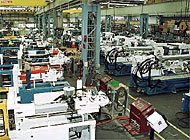Swiss economy seen improving by mid-year

There was better news on the Swiss economic outlook this past week with indications that the worst of the slowdown may soon be over.
The latest economic indicator from the Zurich-based Swiss Institute for Business Cycle Research (KOF) showed clear evidence that the economy may be bottoming out and that a recovery may be apparent in the next few months.
The KOF indicator for January, which has a six to nine month lead time, stood at minus 1.09 compared with an upwardly revised December figure of minus 1.11. It was the first time in two years that the KOF indicator had shown any improvement.
“We would expect a change in growth rate trends around summer this year which means that GDP will accelerate again,” says KOF senior economist, Michael Graff.
The Swiss economy has been badly affected by the global slowdown with unemployment on the rise and GDP levels on a downward spiral.
Knife-edge
In the third quarter of last year, the economy was on a knife-edge showing a growth rate of just 0.1 per cent. The GDP level for the fourth quarter will be released next week and most economists expect it to enter negative territory.
So could Switzerland enter a recession, technically two quarters of negative growth, before things pick up.
“I think it’s preliminary to talk about a recession,” says Graff, “What we see now is that all indications point to a zero growth rate in the last quarter of 2001 and possibly even slightly negative growth rates for the first quarter of 2002 but since we already see a change ahead I would not speculate on a recession right now.”
The Swiss National Bank will also be looking at the economic situation carefully to decide what to do when it holds its quarterly monetary policy review on March 21st.
The bank cut interest rates aggressively last year to try to stave off the worst of the downturn. The most recent cut on December 7th took the official target range for the three-month LIBOR (London Interbank Offered Rate) to 1.25 – 2.25 per cent. Will it act again?
“There are no new price movements or economic conditions to justify a major change in monetary policy,” suggests Graff “so my first bet would be no change.”
Export concerns
Swiss exporters have been complaining for more than a year now about the strength of the franc against the euro, the currency of the country’s major trading partner Germany.
Their calls on the Government and the SNB to weaken the franc to make exports cheaper have fallen on deaf ears. But Graff sees some good news for exporters later in the year.
“Exchange rates are very difficult to comment on but I would see some room for the euro to increase. There are so many psychological factors but, if anything, I see the euro going up.”
Unemployment levels in Switzerland have been on the rise as the downturn bites. The January rate was 2.6 per cent with more than 90,000 people registered out of work.
However, the economics minister, Pascal Couchepin said recently that he was confident that the level would not rise above the magic number of 100,000.
“Well, Pascal Couchepin has to be confident,” says Graff, “But given the signals of an upswing that we are getting for the second half of the year then I would conclude he might be right.”
So where will the economy be in twelve months time?
“I suppose we will be within positive values of GDP growth,” says Graff, “And the economic situation will be improving by this time next year.”
by Michael Hollingdale

In compliance with the JTI standards
More: SWI swissinfo.ch certified by the Journalism Trust Initiative
You can find an overview of ongoing debates with our journalists here . Please join us!
If you want to start a conversation about a topic raised in this article or want to report factual errors, email us at english@swissinfo.ch.